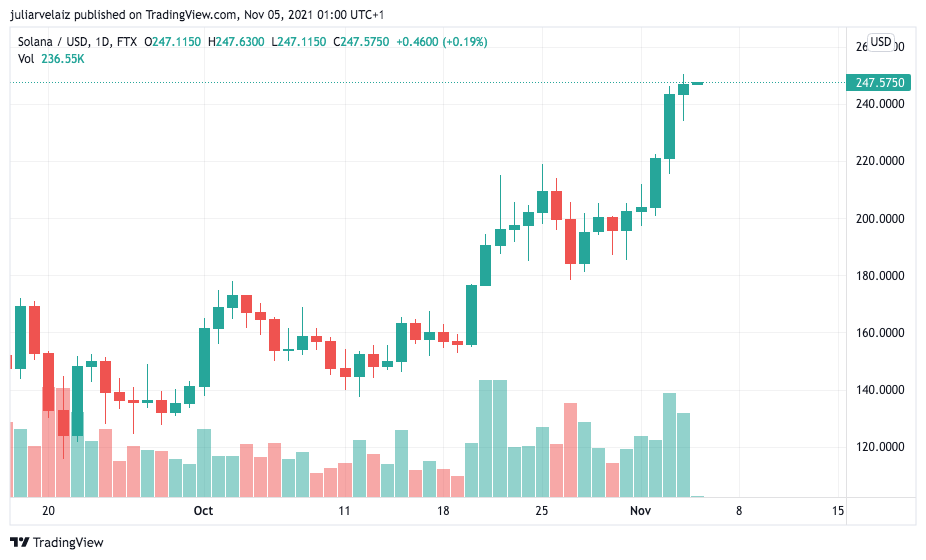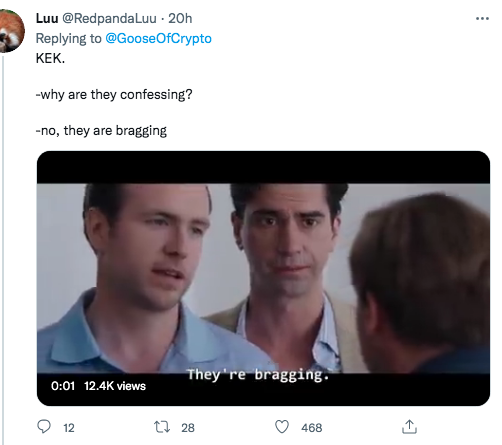- November 5, 2021
- Posted by: admin
- Category: BitCoin, Blockchain, Cryptocurrency, Investments
Solana (SOL) was put in the spotlight after a clip from a big tech investors’ podcast, such as Chamath Palihapitiya, showed them joking about buying SOL with discounts and their intentions for its future. Many saw this as an open example of venture capitalists manipulating prices on the market and further damaging projects.
The podcast ALL-IN is hosted by Chamath Palihapitiya, Jason Calacanis, David Sacks, and David Friedberg. The controversial clip is from episode number 50 where they sat to talk about “Crypto investing deep dive, Facebook’s whistleblower fallout, Chappelle’s new special & more”, as the title reads.
Chamath tells Calacanis jokingly “That’s where you’re hiding all that Solana, under your eyes. You better clear that Solana position, what’s your lock-up, 24 months? (…) He’s trying to sell it to me on text messages. We’re negotiation discounts”. The conversation follows up like so:
Sacks: Hey, you’re f****** the whole thing up! I’m hodling
Palihapitiya: You think I’d buy hundreds of millions of dollars of anything without a discount? Everything is a discount.
Calacanis: Everything is discounted. You wanna clear that position in an LLC?
Sacks: Are you saying I got a billion dollars of Solana?
Palihapitiya: No, bro, I’m saying that I have one, I bought it at a discount.
Sacks: But you’re hodling, correct?
Palihapitiya: ish
Sacks: Yeah, me too.
As Chamath Palihapitiya joked about getting discounts to buy Solana, Twitter users got enraged over the idea of giving the rich even more privilege -with discounts to dump on retail- inside the crypto environment.
Related Reading | Is Chamath Behind The Controversial BitClout?
The episode was published over a week ago but got all the attention after Chamath Palihapitiya revealed his co-leading position in Syndica, an infrastructure developer company, with an $8 million Seed Round. They are focusing on building a “scalable developer infrastructure” for Solana: Web 3.0’s cloud infrastructure.
Now users claim that Venture Capitalists are the ones manipulating the price of tokens on the market, thus pumping and dumping: making a lot of revenue, then sinking the value.
Only vulture capitalist destroy the project and empoverish all the other investors on their way out. If that’s what ends up happening I don’t think we should normalize that as ok because it’s what all VCs do, cus it’s not.
Twitter user – @antique_land
Is Solana Losing Popularity Over Small Investors?
There were further suggestions from users who cannot see “any path to decentralization for SOL”. The general worry is that the project is decentralized but the SOL company is not, ultimately depending on a centralized network where the rich have the bigger part of the stake and the power to flip it over.
Related Reading | Why Bitcoin, Ethereum, And Solana Are Posting Major Gains In The Market
They openly laugh about dumping on video. They know it’s not here for the long haul, and that it’s a shiny centralized VC chain to market sell into at the top of the bull. No nation will build on it. It’s a glorified centralized network with slick marketing and heavy influence.
(…)
Solana is objectively an insider’s VC coin. VCs cash in profits. It’s literally their job. When over half the supply is professionally obligated to sell, the price doesn’t fare well long term.
– Twitter user @WildWarriorsNFT
Other users claimed the published clip was taken out of context to create FUD (meaning: fear, uncertainty, and doubt) around Solana. Its fans have been calling it the best alternative in the crypto market and are enthusiastic about its fast blockchain, considering it a strong Ethereum competitor.
Calacanis raised the question on what would be the best time for clearing a position on assets they invested in early, “What’s enough? 100X? 500X? You gotta at some point bank a win.”, to which the other investors responded:
Palihapitiya: I think you have to put things in a bucket of: is it an investment or is it something that represents an idea that you love so much. If it’s the latter, you should never sell, if it’s the former, yeah, you have to manage risking.
Sacks: Or rather is it a trade or is it something you want to own?
But would the common user invest in the future of something that depends on the rich deciding whether they have enough sentimental connection over it?

